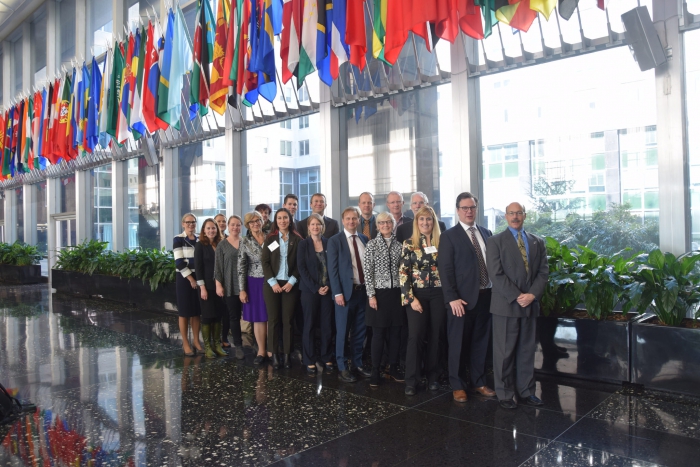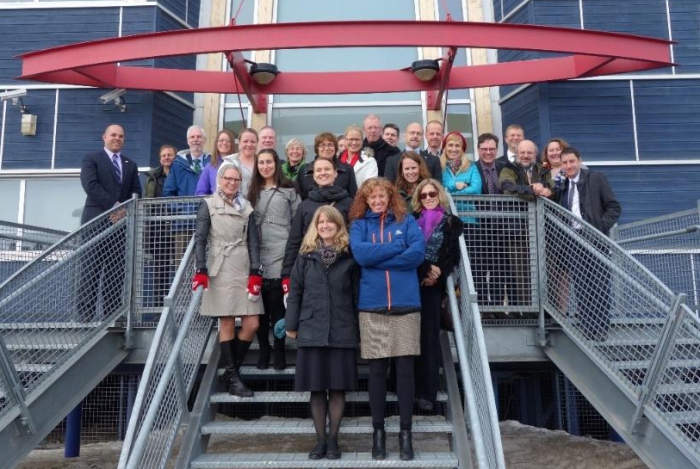By: Lee McDavid, Arctic Program Manager, Institute of Arctic Studies Dartmouth College, Dickey Center for International Understanding
The U.S. Department of State's Bureau of Educational and Cultural Affairs has announced the launch of the second Fulbright Arctic Initiative for 2018–2019. This program follows the first Fulbright Arctic Initiative (2015–2017), which was a new multidisciplinary and multinational team research program designed around specific applied research challenges in the areas of water, energy, and health and infrastructure. The first Fulbright Arctic Initiative coincided with the U.S. chairmanship of the Arctic Council and was designed to create a network to stimulate international research collaboration on Arctic issues, while at the same time increasing mutual understanding between people of the U.S. and people of other countries.

The three thematic working groups for the 2015-2017 program focused on water, energy, and health and infrastructure issues in the Arctic and were comprised of 17 faculty, professionals, and applied researchers from disciplines ranging from art and urban planning to energy and health. The program developed a team approach to identify stakeholders in the research, seek public engagement, and make policy recommendations. The program was led by Ross Virginia, Director of the Institute of Arctic Studies and Myers Family Professor of Environmental Science at Dartmouth College, and Michael Sfraga, Director of the Polar Initiative at the Woodrow Wilson Center, and affiliate professor, International Arctic Research Center and former vice chancellor at University of Alaska Fairbanks.

"The first Fulbright Arctic Initiative created a strong network on which the new group can build," said Virginia. "They demonstrated the power of the Fulbright model for collaborative applied research to inform policy, and we look forward to building on their success and lessons learned." The second Fulbright Arctic Initiative will fund at least 12 scholars from the eight countries that sit on the Arctic Council—the United States, Canada, Denmark, Finland, Iceland, Norway, Russia, and Sweden—for 18 months of collaborative multidisciplinary and multinational research in two focus areas: Resilient Communities and Sustainable Economies. The scholars' work will emphasize communication across disciplines and knowledge co-production, with the objective of translating theory into practice and addressing public-policy research and questions relevant to Arctic Council member states. As Co-Lead Scholars, Virginia and Sfraga will provide intellectual leadership while mentoring program participants and facilitating discussion and collaboration.
The Fulbright Program is the flagship international educational exchange program sponsored by the U.S. government and is designed to build relations between the people of the United States and the people of other countries that are needed to solve global challenges. The Fulbright Program is funded through an annual appropriation made by the U.S. Congress to the U.S. Department of State. Participating governments and host institutions, corporations, and foundations around the world also provide direct and indirect support to the Program, which operates in over 160 countries worldwide.
"The Department of State is committed to ensuring the success of the second Fulbright Arctic Initiative, including through our cooperation with partner governments and Fulbright Commissions in fellow Arctic member states," said Acting Assistant Secretary of State for Educational and Cultural Affairs Mark Taplin. "The Arctic is a vital area of global importance. Fulbright Arctic Initiative scholars will play a valuable role in stimulating international scientific cooperation and community engagement to help policymakers address critical challenges and opportunities facing the Arctic."
Established researchers, early-career specialists, and indigenous knowledge experts from the Arctic Council member states can now apply for the program, which runs from spring 2018 through fall 2019. The application deadlines are 30 October 2017 for U.S. applicants and 16 October 2017 for international applicants. Scholars can apply online through on the Fulbright Arctic Initiative website.
For further information, see Arctic Yearbook 2016: Briefing Note on the Fulbright Arctic Initiative and the brief Science, Policy, and Diplomacy for a Sustainable Future.
